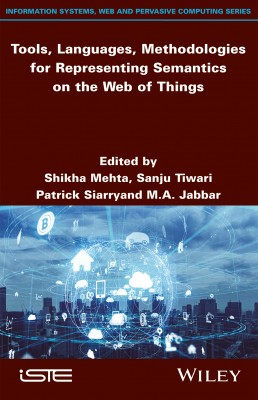
Edited by
Shikha Mehta, Jaypee Institute of Information Technology, India
Sanju Tiwari , Universidad Autonoma de Tamaulipas, Mexico
Patrick Siarry, University Paris Est Créteil, France
M.A. Jabbar, Vardhaman College of Engineering, India
This book is a guide to the combination of the Internet of Things (IoT) and the Semantic Web, covering a variety of tools, technologies and applications that serve the myriad needs of the researchers in this field. It provides a multi dimensional view of the concepts, tools, techniques and issues that are involved in the development of semantics for the Web of Things.
The various aspects studied in this book include Multi-Model Multi-Platform (SHM3P) databases for the IoT, clustering techniques for discovery services for the semantic IoT, dynamic security testing methods for the Semantic Web of Things, Semantic Web-enabled IoT integration for a smart city, IoT security issues, the role of the Semantic Web of Things in Industry 4.0, the integration of the Semantic Web and the IoT for e-health, smart healthcare systems to monitor patients, Semantic Web-based ontologies for the water domain, science fiction and searching for a job.
1. The Role of Semantic Hybrid Multi-Model Multi-Platform (SHM3P) Databases for loT by Sven Groppe, Jinghua Groppe and Tobias Groth.
2. A Systematic Review of Ontologies for the Water Domain by Sanju Tiwari and Raul Garcia-Castro.
3. Semantic Web Approach for Smart Health to Enhance Patient Monitoring in Resuscitation by Fatima Zahra Amara, Mounir Hemam, Meriem Djezzar and Moufida Maimour.
4. Role of Clustering in Discovery Services for the Semantic Internet of Things, by Shachi Sharma.
5. Dynamic Security Testing Techniques for the Semantic Web of Things: Market and Industry Perspective by Dhananjay Singh Chauhan, Gaurav Choudhary, Shishir Kumar Shandilya and Vikas Sihag.
6. SciFiOnton: Modeling, Visualization and Evaluation of Science Fiction Ontologies Based on Indian Contextualization with Automatic Knowledge Acquisition by Gerard Deepak, Ayush A. Kumar and Sheeba J. Priyadarshini.
7. Semantic Web-Enabled loT Integration for a Smart City by Ronak Panchal and Fernando Ortiz-Rodriguez.
8. Heart Rate Monitoring Using loT and AI by Kalpana Murugan, Cherukuri Nikhil Kumar, Donthu Sai Subash and Sangam Deva Kishore Reddy.
9. loT Security Issues and Its Defensive Methods by Keshavi Nalla and Seshu Vardhan Pothabathula.
10. Elucidating the Semantic Web of Things for Making the Industry 4.0 Revolution a Success by Deepika Chaudhary and Jaiteg Singh.
11. Semantic Web and Internet of Things in e-Health for Covid-19 by Anurag and Naren Jeeva.
12. Development of a Semantic Web Enabled Job_Search Ontology System by Hina J. Chokshi, Dhaval Vyas and Ronak Panchal.
Shikha Mehta is Associate Professor in the Department of CSE & IT, Jaypee Institute of Information Technology, India. Her research interests include machine/deep learning algorithms, nature-inspired computing and social networks analytics.
Sanju Tiwari is Senior Researcher at Universidad Autonoma de Tamaulipas, Mexico, DAAD Post-Doc-Net AI Fellow and PhD co-supervisor at Rai University, India, and has worked as a post-doctoral researcher in OEG, Universidad Politecnica de Madrid, Spain. Her research interests include artificial intelligence, knowledge graphs and ontology engineering.
Patrick Siarry is Professor in automatics and informatics at University Paris Est Créteil, France. His research interests include the design of stochastic global optimization heuristics and their applications to various engineering fields.
M.A. Jabbar is Professor and Head of the Department of CSE (AI & ML), Vardhaman College of Engineering, India. His research interests include artificial intelligence, Big Data analytics, bio-informatics and machine learning.